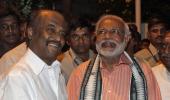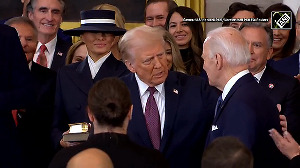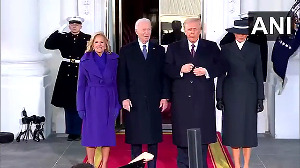Rajinikanth’s visible electoral strength is his constant mouthing of the term, ‘aanmiga arasiyal’, or ‘spiritual politics’, without he having to explain what it is. By implication, it is all that what Dravidian politics is not about. It may imply anti-corruption, being against Periyar’s forgotten anti-god, anti-Brahmin dictum, but also ends up covering ‘Tamil pride’, which begins with Tamil language where, as a Maharashtrian from Karnataka, he has more to defend himself.
However, in the contemporary national context, aanmiga arasiyal is seen as a front for Rajini to market his brand of ‘soft Hindutva’ but identified even more with the BJP and Prime Minister Narendra Modi in political terms, says N Sathiya Moorthy.

The year, 1996. A 40-something autorickshaw driver in Chennai said despite being a member of the ruling All India Anna Dravida Munnetra Kazhagam, he would vote against Chief Minister Jayalalithaa’s party the very next day, because ‘Thalaivar’ had said, “If they come back to power, even god cannot save Tamil Nadu.”
Rival DMK’s M Karunanidhi alone used to be known as ‘Thalaivar’, or leader, in Tamil Nadu at the time, but this reference was to superstar Rajinikanth, whose one-liners had caught the national attention.
Jayalaltihaa lost that election, including from her own Bargur seat, not because of Rajini, but because he betted on the winning horse, the DMK-Tamil Maanila Congress combine, the latter a breakaway Congress party founded by the late G K Moopanar.
Today, close to 25 years later, Rajini is donning the ‘Thalaivar’ cap himself, and it remains to be seen if he can ‘change’ the Dravidian stranglehold over electoral Tamil Nadu extending for double that period, from 1967 on -- especially after veteran political leaders with relatively proven cadre base with election experience had tried and failed.
Come Saturday, December 12, and Shivajirao Gaekwad will be turning 70. Known by his screen-name Rajinikanth, given by acclaimed film-maker K Balachander, who introduced him in a minor, climax role in Apoorva Raagangal (Rare Tunes, 1975), the one-time bus conductor from Bengaluru had to wait for his mentor’s second movie next year, Moondru Mudichu (Three Knots), to display his famous mannerisms and electrifying screen presence.
No, Rajinikanth was not a name borrowed from thespian Sivaji Ganesan’s melodrama, Gauravam (Pride, 1973), but a character from Balachander’s Major Chandrakanth (1966). But then, Rajini had changed the face and pace of Tamil cinema as Sivaji Ganesan alone had done with his maiden Parasakthi way back in 1952.
Close to a quarter century since, the new generation film-goer wanted something different from what Sivaji Ganesan had offered with social dramas and dialogues loaded with alliterations, from the pens of those like Karunanidhi himself -- and in an era when film-goers had only the song-and-dance sequence, either of the mythological or historical variety, all of them slow paced. Rajini was at the right place at the right time, and neither the man, nor the medium, had to look back after that.
The rest is all contemporary film lore, not only in Tamil cinema, but all over where Tamils live: quitting his fixed-pay job for an unsure filmi future, sleeping on Chennai’s pavements, at times, while doing a course in acting, and then shooting 24x7 for weeks and months, leading to physical and mental tension.
His marriage to Tamil Brahmin Latha, and frequent travels away from the maddening crowds of Kollywood to the tranquillity of the Himalayan foothills, is at the root of his ‘spiritual’ image since then.
Today, after donning the superstar cap for close to a quarter century, when at times he paced his films every two or three years and yet remained at the top, Rajinikanth is casting himself in another of his famed home productions.
After keeping his fans and prospective Opposition guessing for so long, he has opened up to declare that he would launch his own political party in January, preceded by publicising its name and flag on New Year’s Eve.
To the date, it would be three full years after his 2017 declaration to contest elections 2021, but it comes only after keeping his fans guessing ever more at every turn, so much so that most of them had given up for good.
Are Rajini fans, who renamed their associations as ‘Rajini Makkal Mandram’ (Rajini People’s Forum, RMM) at his instance in 2018, with a flag of their own, excited?
They are already on campaign mode, and are confident of him becoming chief minister.
Going by the first-day, first-show footfalls for his latest films, which came in relatively quick succession, they have concluded that he has a ‘committed’ 12-per cent vote-share -- nearly double what political analysts are ready to grant him, at the starting point.
The fans do not want to make allies of existing parties after he had vowed to change the alternating Dravidian rule, and end their corrupt ways for good.
“He is already seen as being supported, if not tutored, by the ruling BJP at the Centre, and we need to live down that image if we have to make the grade in ‘Dravidian’ Tamil Nadu.” According to some, at the last consultative meeting with RMM district secretaries, Rajini reportedly told them he cannot upset long-standing Muslim and Dalit fans.
In context, Rajini is perceived as already being stymied by the choice of an ex-BJP office-bearer in Arjuna Murthy as chief coordinator for the party, whose name he is yet to announce -- and in more ways than one. Apart from the political implications attaching to Murthy’s BJP past, his sudden choice has made RMM cadres unsure about the kind of coordination that could be expected at their level.
“Arjuna Murthy, none of us know, haven’t even heard of him before, nor seen with ‘Thalaivar’ earlier. His may be a high-tech, non-nonsense business approach but we basically have only an emotional bonding to the superstar, even where some of us may be partly high-tech at the very least.”
Likewise, they are uncomfortable with the choice of a party-hopper in Tamizharuvi Manian, (maybe the best political orator in the state today), to oversee the affairs of the new party, as “none of us will have any direct, election-related experience”. And Manian can continue to be an embarrassment, as social media is full of his earlier anti-Rajini statements, made forcefully, to both interviewees and audiences alike.

At least three questions remain.
What about Rajini’s earlier declaration not to offer himself as the party’s chief minister candidate? “Without ‘Thalaivar’ as CM candidate, our chances will diminish.”
If they had to contest alone, and their own count is only 12 per cent ‘committed votes’, what about the remaining 20-25 per cent vote share required for a majority of 118 seats in a 234-member assembly? The fans cite some YouTube astrological predictions that say that “the Rajini aura and magnetism will do the trick”. A tall order this in real-life politics, yes, but then the cadres are confident, nonetheless.
Two, Rajini’s visible electoral strength is his constant mouthing of the term, ‘aanmiga arasiyal’, or ‘spiritual politics’, without he having to explain what it is. By implication, it is all that what Dravidian politics is not about. It may imply anti-corruption, being against Periyar’s forgotten anti-god, anti-Brahmin dictum, but also ends up covering ‘Tamil pride’, which begins with Tamil language where, as a Maharashtrian from Karnataka, he has more to defend himself.
This is unlike in the case of MG Ramachandran, a Malayali, and Jayalalithaa, a Tamil-Brahmin from Mysore who, however, ensured their greater Tamil identity. Rajini’s unclear and at times contradictory statements on the Cauvery water dispute with Karnataka and a host of other issues passing off for pan-Tamil concerns, through the past decade and more, have made his current declaration of Tamil Nadu accepting him as one of its sons over 40-plus years now, sound, rather hollow -- or at least, thus far, for the traditional pan-Tamil voter.
In the contemporary national context, aanmiga arasiyal is seen as a front for Rajini to market his brand of ‘soft Hindutva’ but identified even more with the BJP and Prime Minister Narendra Modi in political terms. But these voters may be confused as the BJP, as a strategy, may continue in the AIADMK alliance -- but by sticking to a higher seat demand, may weaken the state’s ruling party, pushing disgruntled elements at the middle-level towards the Rajini camp -- or, that is a current calculation.
Three, given his age and confessed health condition -- following a kidney transplant some years ago --- even a victorious Rajini is unlikely to stay on in active politics until after elections 2026, or even possibly for the Lok Sabha elections, two years earlier in 2024. According to some within the Rajini camp, “That is what the Modi-Amit Shah duo seem to be desiring and targeting -- hijacking the party once Rajini quits active politics.”
For now, prospective rivals in the DMK and the ruling AIADMK seem unperturbed. Leaderships of both parties have reserved their comments until after Rajini has named his party and come up with his policy statement. But in between, his own RMM cadres, who used to go bonkers over his famous one-liners on the silver screen, are not so sure.
“Thalaivar’s statement on the need to change state politics is accepted and acknowledged by all voters other than those that are committed to other parties. But people don’t rate one-liners in real-life in the same way, they relish them on the silver screen. More importantly, the likes of his recent one, ‘If I win, it is Tamil Nadu’s victory; if I lose, it is Tamil Nadu’s loss’ makes him out as over-confident to the point of being arrogant. People don’t appreciate such an attitude from a leader even before he had launched is party.”
Such one-liners of the Rajini kind had their origins in his maiden home-production Valli (1993), which was a carefully-crafted project, to put him beyond the pale of naturally ageing process, as MGR had done in his time. His ‘Naan oru thadavai sonna nooru thadavai sonna madhiri’ (Baasha, 1995), ‘En vazhi, thani vazhi’ (Padayappa, 1999, in which the female antagonist’s character resembled Jayalalithaa’s) and ‘Summa adhirudhilley?’ (Sivaji, The Boss, 2007) have outlived even fading memories of those box-office hits.
But ‘one-liners’ do not a politician, and a successful one that, make.
The other problem for Rajini could be the choice of candidates for all 234 constituencies. Team Rajini is believed to have done a good job of setting up RMM panels down to the booth level, as far back as 2018-19. But he is also reported to have told them that he would have to rope in influential local leaders with face recognition as his candidates, even if they are from rival political parties.
This could upset ‘swing voters’ who may otherwise be ready to consider voting for Rajini, this one time, as it would set at naught his commitment to undo the Dravidian super-structure and also ‘end their corruption’.
Will inducting Dhanush, the superstar’s award-winning actor son-in-law, help in the campaign? “Yes-and-No,” is the answer. Given Rajini’s health condition, and even otherwise, given the lack of popular faces, Dhanush, with his own fan following, could share the campaign-burden. His fans too would add to the RMM votes.
But then, it is for Dhanush to decide. More importantly, it could invite charges of ‘dynasty politics’, which the DMK is already being blamed for.
N Sathiya Moorthy, veteran journalist and political analyst, is Distinguished Fellow and Head-Chennai Initiative, Observer Research Foundation.











 © 2025
© 2025